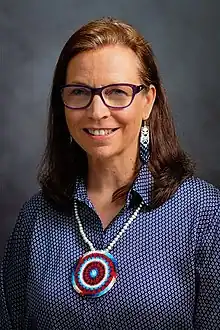Karina Walters | |
|---|---|
 | |
| Born | Karina Lynn Walters April 18, 1964 Los Angeles, California, U.S. |
| Citizenship | American Choctaw |
| Alma mater | University of California, Los Angeles |
| Scientific career | |
| Fields | Social epidemiology, health promotion, Health of Native Americans in the United States |
| Institutions | Columbia University School of Social Work University of Washington School of Social Work National Institutes of Health |
Karina Lynn Walters (born April 18, 1964) is a Choctaw-American social epidemiologist, health promotion scholar, and former psychotherapist. She is the director of the Tribal Health Research Office at the National Institutes of Health. Walters was a professor and the Katherine Hall Chambers Scholar at the University of Washington School of Social Work.
Life
Walters was born on April 18, 1964[1] in Los Angeles, California and is an enrolled member of the Choctaw Nation of Oklahoma.[2][3] She earned a B.A. in sociology from the University of California, Los Angeles (UCLA) in 1987.[2][4] Walters completed a M.S.W. (clinical) in social welfare in 1990 at UCLA.[4] She worked as a psychotherapist.[3][4] From 1993 to 1995, she was appointed by mayors Tom Bradley and Richard Riordan as commissioner for the Los Angeles County American Indian Commission.[3][4] In 1995, Walters earned a Ph.D. in social welfare from UCLA.[2][4] Her dissertation was titled Urban American Indian Identity and Psychological Wellness.[3] Rosina Becerra was her dissertation chair.[3]
Walters is a social epidemiology and health promotion scholar.[2] Her early social epidemiological research involved LGBT, two-spirit, and urban American Indian and Alaska Native (AI/AN) populations across the United States.[2] She was an assistant and later associate professor at the Columbia University School of Social Work from 1995 to 2001.[4] Walters joined the faculty at the University of Washington School of Social Work in 2001.[4] She was promoted to full professor in 2011.[4] Walters was the director of the doctoral program from 2003 to 2005.[4] She served from 2012 to 2019 as the associate dean for research at the University of Washington School of Social Work, overseeing and assisting faculty in generating $20–30 million in grants annually.[2] Walter was a tenured full professor and the Katherine Hall Chambers Scholar.[2] She was an adjunct professor in the department of global health and the University of Washington School of Public Health.[2] She was the founding director of the University of Washington Indigenous Wellness Research Institute.[2]
As of 2023, Walters has over 28 years of AI/AN health research experience.[2] She conducted social epidemiological research on the environmental, historical, social, and cultural determinants of health and health equity of AI/AN communities as well as designed and empirically tested, tribally derived chronic disease prevention interventions.[2] Walters has conducted tribal-based intervention research in the areas of substance use disorders, obesity prevention and physical activity promotion, diabetes and depression, and HIV prevention.[2] She has served as an National Institutes of Health (NIH) principal investigator or co-investigator on 35 NIH awards from multiple NIH Institutes.[2] She is the first American Indian fellow inducted into the American Academy of Social Work and Social Welfare.[2]
On March 16, 2023, Walters was selected to lead the NIH Tribal Health Research Office (THRO).[2] She succeeded acting director Robin Kawazoe on April 24, 2023.[2]
References
- ↑ "Karina L. Walters". id.oclc.org. Retrieved 2023-04-01.
- 1 2 3 4 5 6 7 8 9 10 11 12 13 14 15 16 Tabak, Lawrence A. (2023-03-13). "Dr. Karina Walters selected to lead NIH Tribal Health Research Office". National Institutes of Health (NIH). Retrieved 2023-04-01.
 This article incorporates text from this source, which is in the public domain.
This article incorporates text from this source, which is in the public domain. - 1 2 3 4 5 Walters, Karina L. "Curriculum Vitae" (PDF). University of Washington School of Social Work. Retrieved 2023-03-31.
- 1 2 3 4 5 6 7 8 9 "Karina L. Walters | School of Social Work". University of Washington School of Social Work. Retrieved 2023-04-01.